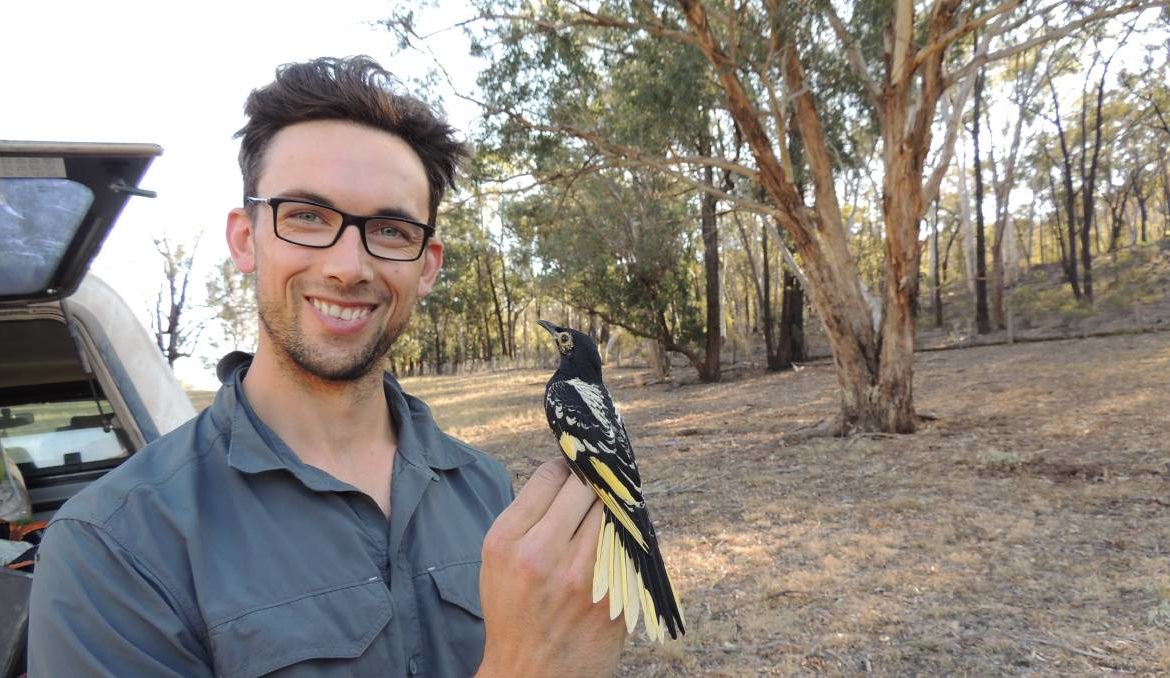news, latest-news,
One of Australia’s loveliest birds has forgotten how to sing – and without a love song, its future is bleak. As numbers of the regent honeyeater fall, the few remaining birds don’t have other regent honeyeaters to learn their wooing song from. It means they don’t find partners – and without a partner, their numbers decline even further. But human help is at hand. A last-ditch effort is being made to save the severely endangered species by teaching it the song it needs to find love (or at least a mate). Scientists from the Australian National University are intervening to try to teach the love-deprived former songster how to chirp again. Dr Ross Crates and his colleagues are playing recordings of the love song of the bird to young, growing chicks in a zoo in the hope that the youngsters will learn the right tune to be able to woo more successfully. “Females will avoid males that sing unusual songs,” Dr Ross said. “If endangered birds are unable to learn how to sing correctly, it seriously impacts their ability to communicate,” he said. “It could also be exacerbating the honeyeater’s population decline, because we know a sexy song increases the odds of reproduction in songbirds.” Sometimes, regent honeyeaters do learn to sing but badly because there aren’t enough good examples of the right way. In places where there were still reasonable numbers, males sang rich and complex songs, according to the ANU study. But where the birds were rare, males sang simplified or totally incorrect songs. “For example, 18 male regent honeyeaters – or around 12 per cent of the total population – were only able to copy the songs of other bird species,” ANU researcher Dr Dejan Stojanovic said. “This lack of ability to communicate with their own species is unprecedented in a wild animal. We can assume that regent honeyeaters are now so rare that some young males never find an older male teacher.” Dr Ross said that the big problem was land clearance which reduced the bird’s habitat and increased the competition it faced when it came to finding food. “It had safety in numbers but as the flocks get smaller, they can’t compete and now the population is so small that some of the young birds are never encountering older honeyeaters and so they never learn to sing,” he said. There are regional dialects to the honeyeaters’ song. In the Northern Tablelands, the song is longer than in the Blue Mountains where it is clipped. In captivity, the birds develop their own song which makes no sense to any other bird outside their group. The ANU scientists have decided to teach the birds the Blue Mountains dialect because there are more there than on the Northern Tablelands. He doesn’t know if the plan will work. The freed birds, fresh with their newly learnt love song, may still not attract a mate. It may be that they don’t quite learn the dialect perfectly enough. But the regent honeyeater is “on the very brink”, according to Dr Cates. “It’s a now or never situation for this bird.” Our journalists work hard to provide local, up-to-date news to the community. This is how you can continue to access our trusted content:
/images/transform/v1/crop/frm/steve.evans/302ab00b-8db1-40c2-babc-e7f33bb5a579.JPG/r0_313_4608_2917_w1200_h678_fmax.jpg
One of Australia’s loveliest birds has forgotten how to sing – and without a love song, its future is bleak.
As numbers of the regent honeyeater fall, the few remaining birds don’t have other regent honeyeaters to learn their wooing song from. It means they don’t find partners – and without a partner, their numbers decline even further.
But human help is at hand. A last-ditch effort is being made to save the severely endangered species by teaching it the song it needs to find love (or at least a mate).
Dr Ross Crates and the lonely regent honeyeater. Pictures: Supplied
Scientists from the Australian National University are intervening to try to teach the love-deprived former songster how to chirp again.
Dr Ross Crates and his colleagues are playing recordings of the love song of the bird to young, growing chicks in a zoo in the hope that the youngsters will learn the right tune to be able to woo more successfully.
“Females will avoid males that sing unusual songs,” Dr Ross said.
“If endangered birds are unable to learn how to sing correctly, it seriously impacts their ability to communicate,” he said. “It could also be exacerbating the honeyeater’s population decline, because we know a sexy song increases the odds of reproduction in songbirds.”
Sometimes, regent honeyeaters do learn to sing but badly because there aren’t enough good examples of the right way.
In places where there were still reasonable numbers, males sang rich and complex songs, according to the ANU study.
But where the birds were rare, males sang simplified or totally incorrect songs.
How science could help lonely honeyeaters find their voice, and a mate
/images/transform/v1/crop/frm/steve.evans/302ab00b-8db1-40c2-babc-e7f33bb5a579.JPG/r0_313_4608_2917_w1200_h678_fmax.jpg
As numbers of the regent honeyeater fall, the few remaining birds don’t have other regent honeyeaters to learn their wooing song from.
news, latest-news,
2021-03-18T03:00:00+11:00
https://players.brightcove.net/3879528182001/default_default/index.html?videoId=6241176799001
https://players.brightcove.net/3879528182001/default_default/index.html?videoId=6241176799001
The regent honeyeater in song
“For example, 18 male regent honeyeaters – or around 12 per cent of the total population – were only able to copy the songs of other bird species,” ANU researcher Dr Dejan Stojanovic said.
“This lack of ability to communicate with their own species is unprecedented in a wild animal. We can assume that regent honeyeaters are now so rare that some young males never find an older male teacher.”
Dr Ross said that the big problem was land clearance which reduced the bird’s habitat and increased the competition it faced when it came to finding food.
“It had safety in numbers but as the flocks get smaller, they can’t compete and now the population is so small that some of the young birds are never encountering older honeyeaters and so they never learn to sing,” he said.
This little honeyeater is singing – but is it the right song?
There are regional dialects to the honeyeaters’ song. In the Northern Tablelands, the song is longer than in the Blue Mountains where it is clipped.
In captivity, the birds develop their own song which makes no sense to any other bird outside their group.
The ANU scientists have decided to teach the birds the Blue Mountains dialect because there are more there than on the Northern Tablelands. He doesn’t know if the plan will work. The freed birds, fresh with their newly learnt love song, may still not attract a mate.
It may be that they don’t quite learn the dialect perfectly enough. But the regent honeyeater is “on the very brink”, according to Dr Cates.
“It’s a now or never situation for this bird.”
Our journalists work hard to provide local, up-to-date news to the community. This is how you can continue to access our trusted content:







